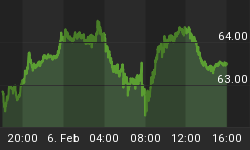Readers of this column understand how the Herculean government deflation fighting effort will be inadequate. The incipient component necessary for the development of modern bubbles and the subsequent deflation fighting effort is something called inflation. What exactly is inflation? Mention inflation to someone and the likely response is something akin to "prices rising", or "things cost more", or "my dollar doesn't go as far". While the comments are valid, they are based more on the effects of inflation rather than their true source or definition. The view of inflation is largely pejorative until the public considers the effects of inflation on their salaries or their assets. In these cases, having a fatter paycheck, or witnessing home values increasing or the value of a collectible increasing creates an entirely different feeling.
Before discussing inflation, let's first understand the terms money and wealth. What is money? Isn't it what you have in your wallet? What about what you have in the bank in a checking or savings account? Do we consider a 401(k) account money? Is any of this wealth? Is the equity in my home money or wealth? Webster's dictionary from 1968 says,
Money: Standard pieces of gold, silver, copper, nickel etc. stamped by government authority and used as a medium of exchange and a measure of value.
The online Webster's dictionary reads,
Money: Something (such as coins or bills) used as a way to pay for goods and services and to pay people for their work. A person's wealth. The money that a person has
Notice how the Webster definition changed? They even use the word money to define money!
What is wealth? Is it something you possess? The 1968 Webster's publication suggests,
Wealth: Much money or property.
Adam Smith in his work, The Wealth of Nations, said that wealth was "the annual produce of the land and labour of the society." In my publications I define money and wealth as follows,
Wealth: A material item produced by human effort having exchange value. Exchange value means it can be traded or substituted for something else.
Money: A medium of exchange, that is a unit of account (something measurable), and a direct store or representation of wealth.
Notice how my definition of money differs from the modern Webster's definition. My definition adds "a direct store or representation of wealth". This distinction is largely responsible for what we term inflation. In other words, our money is still a medium of exchange and measurable but its representation of wealth has changed.
Why do we need money? Without money all of our commercial or even personal financial transactions require bartering. Clearly, this adds friction to any economy. A precondition for money is public recognition of this friction and agreement on a unit of measure representing exchange of wealth items. We use money for the payment of goods and services and repayment of debt.
For much of human history, tangible goods such as gold, silver, copper, brass and seashells formed the basis of money. The initial usage of paper money was likely in China around the time of the Tang dynasty (800 AD). The Chinese government thought it prudent to issue paper to relieve the weight burden of precious metal coin transport. The paper was fully redeemable for coin upon demand. It was explicitly understood that having paper was the same as having the precious metal coin. Thus, it satisfied our criteria for money as defined earlier. It is important to understand that even though a piece of paper was issued as a substitute for coins, our definition of money still held - it was a medium of exchange, that was a unit of account and a store of value. While the paper was not wealth per se, it represented something that was wealth (precious metal coin).
The Chinese paper continued to satisfy our definition of money until the government began to issue more paper money in relation to the existing coin stock. The additional issuance of paper money did not mean Chinese society was wealthier. On the contrary, wealth was altered since the ratio of paper to existing precious metal coin increased making each piece of paper worth less. Wealth did not suddenly materialize by the appearance of the extra paper. For wealth to appear material items produced by human effort having exchange value would have to appear as well. The only thing that appeared was more paper not backed by precious metal coin (wealth). The result was more money in the system available to claim existing wealth. More paper money was available to buy existing goods and services making each piece of paper worth less and goods and services cost more.
Eventually the paper money was devalued so much that it ceased to have value, was unacceptable and replaced by new issues. In other words, there was a loss of confidence in the entire paper money system. The increased issuance of paper money relative to the coin stock was an early example of what we call inflation.
What reason does a government or other operator have for increasing the supply of paper relative to the wealth in the economy? Cui bono (who benefits)? The relationship of money to a wealth component imparts a discipline on the system. Those holding paper intrinsically know its value. When the relationship is altered, the money operator has deceived the holder of the paper into thinking it is worth more than it is. The additional paper can be used by the paper issuer to acquire wealth or consume resources previously out of reach.
The Chinese were not unique in the sleight of hand exercise called inflation. In the next column I will examine similar events in the history of the United States.















